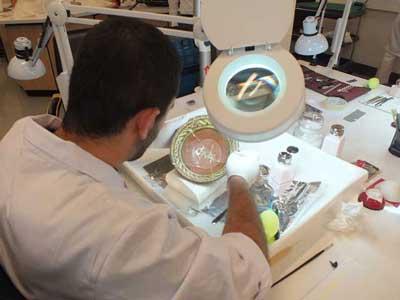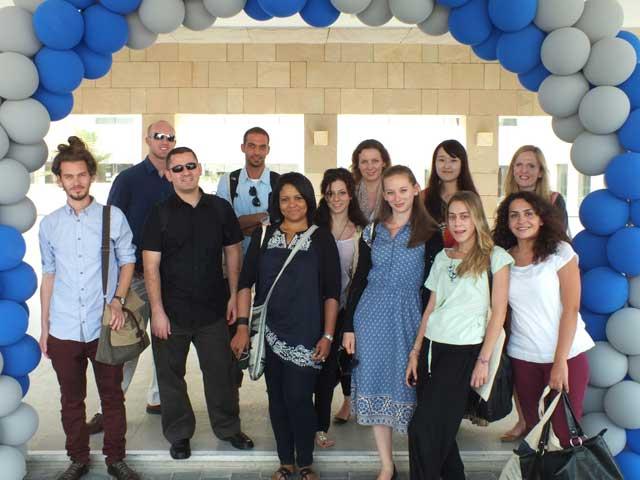Setting up a new department is an exciting process, and particularly so in a location such as Qatar. It is hard work – and rich in experiences. The most pleasant new experience so far has been to welcome our first-ever cohort of 30 Masters’ students, enrolled across our three different degree programmes (Fig. 1). As expected, the MA in Museum and Gallery Practice recruited best, with about half of all students on this one-year MA. Across the board, our student body is as international and as diverse as one could hope for at UCL in such a location; just under one third of our students are Qatari nationals, together with a handful of others already living in the country before they enrolled. In addition to students from Syria and Jordan, about one third is from the US and across Europe, and from as far away as Panama and China. Even out here in Doha, it is UCL as a Global University. And since we are here, among other reasons, to bring a truly international education to the people of Qatar and the region, this is a great success in its own right.
We have been able to welcome a number of new staff, both academic and to the professional services team. We now stand at just under 30 staff in total, compared to around 20 this time last year. The sheer amount of work which this growth creates, from preparing the adverts to managing the application process, from setting up selection panels to the coordination of multiple interviews for often international candidates, is of course a small price to pay for the contribution which these new staff will make to our department. But the work does not end there, given that most new appointments are being made from outside Qatar, meaning that our new colleagues have to go through the full immigration and visa process, need assistance in finding suitable accommodation and often even school-places for their children. We surely now know a lot about the many processes involved here in Qatar, and which start already in the various home countries of our new staff – and we look forward to applying this knowledge during the coming year, as we continue to grow. On a more personal note, this immigration process is also an interesting experience for me as a European citizen, used to moving freely within the EU and often benefitting from privileged visa arrangements with other major countries. It does put into perspective the experience which many international students (and staff) have when they move to UCL in the United Kingdom and are required to provide all sorts of documentation before they are allowed into the country – and often again whenever they move or travel.
A major partner for us is the Qatar Museums Authority. QMA is tasked with developing the country’s cultural heritage and its major museum projects, as well as numerous other cultural events and projects. We work closely with colleagues at QMA, from providing a regular and diverse programme of professional development courses for their staff to academic collaboration in archaeology, conservation and museum studies. Nearly all our students have been involved in one way or another in this collaboration, typically through placements or visits to QMA museums and through the participation of QMA staff in our seminar series. This provides a most beneficial two-way flow of ideas and information: our students gain first-hand insight into the functioning of museums and other cultural units, and QMA staff benefit from the enthusiasm and input of our students, as well as from contributions made by our staff in collegial discussions.
2013 is the Qatar UK Year of Culture, and UCL Qatar is making its own contributions to this QMA-British Council series of events. One was Backstage, an MA in Museum and Gallery Practice student exhibition at the Museum of Islamic Art which highlighted the work that goes on behind the scenes of a museum. It opened on 30 April 2013, in the presence of HE Michael O’Neill, the British Ambassador to Qatar, with a speech by the director of MIA, Aisha al Khater.
In line with our mission to provide high-quality research-led teaching, we enrich the experience for our students through close involvement in current research projects, in the field, the library and museums, and increasingly also in our own labs. I mentioned Rob Carter’s research project on the origins of Doha in last year’s report (Archaeology International 15: 30–32). This QNRF-funded project provides opportunities for hands-on archaeological experience in downtown Doha for our MA Archaeology students, as well as unearthing interesting material for the MSc Conservation Studies students to work on. The MA Museums and Gallery Practice students participated in a buildings survey of old Doha, also linked to this project. Students in all three degree programmes benefitted further from our close collaboration with Msheireb, a major urban regeneration project in the centre of Doha, run by the development arm of Qatar Foundation, which includes four museums under development in heritage houses.
Many of our students undertook their fieldwork placements in UCL projects. First among these is the Ancient Merv Project in Turkmenistan, run by Tim Williams (see also AI 15: 74–88, for this long-standing programme of survey, excavation and conservation). Several conservation and archaeology students spent a month last May embedded with this project, working in a wide range of roles and learning about the reality of excavation and conservation practice under often challenging conditions. Others were placed in museums and agencies across the region – and in London, including at the UCL Petrie Museum of Egyptian Archaeology.
These are but two examples of the growing collaboration between UCL in London and UCL Qatar in teaching and research. We are particularly grateful for the time and energy that many colleagues at the Institute are investing in order to share their experience with us, either as visiting lecturers for week-long compact courses or as examiners and advisers in other roles. I certainly hope that, as we grow, we will one day be able to reciprocate by offering courses for Institute students in subject areas such as Islamic Archaeology, or on other aspects of our work where our programme is complementary to the Institute’s.
We are now operating a suite of conservation labs for teaching and research (Fig. 2), and a set of archaeological materials science labs to underpin our research and doctoral training. As so much in Qatar, they were designed to a high standard and, after the inevitable teething problems (such as trying to locate missing items among the equipment provided by the contractors), we will have all reason to be proud of them.

An MSc Conservation Studies student at work on an object in the UCL Qatar conservation laboratories.
A particular highlight of the academic year was the visit by UCL’s President and Provost last November, and the reception we held in his honour. Attended by several hundred guests from Doha and the wider vicinity, it offered a unique opportunity for Professor Grant to see UCL’s most recent overseas department in action, and for our staff and students to talk to him and other senior UCL staff, alumni and friends. For us, it also served as a test run for the more formal opening ceremony scheduled for 10 September 2013 – but that will be for next year’s report!


